


TBF offers financial and medical benefits, a wide range of complementary and alternative therapies, bereavement grants and welfare advice. Supporting members during times of need, hardship and distress for less than 20p per day. £1.25





TBF offers financial and medical benefits, a wide range of complementary and alternative therapies, bereavement grants and welfare advice. Supporting members during times of need, hardship and distress for less than 20p per day. £1.25

JULY-AUGUST 2023 | ISSUE 286
RAILSTAFF AWARDS 2023 | 16
We reveal this year's host and judges, and how awards success can boost your career.

EMOTIONAL, PSYCHOLOGICAL, AND SPIRITUAL SUPPORT IN THE RAILWAY INDUSTRY | 28

RailStaff shines a light on the magnificent work of the Railway Mission Chaplaincy service..

INCIDENTS, ACCIDENTS, OVERSPEEDING, AND A NEAR MISS | 30 Colin Wheeler is back to discuss all things safety-related on the rail network.
AN OPEN LETTER TO NETWORK RAIL | 34

The ORR writes to Network Rail with concerns about non-compliance on structures examinations.

ORR OFFERS FURTHER RECOMMENDATIONS | 36
The regulator provides more advice aimed at the rail industry as a whole.

HS2: TRAINING THE NATION | 38
The mega-project is providing a boost for regional economies and getting people into work.
AWARD WINNING VR REDUCES COMPLACENCY AMONG SIGNALLING ENGINEERS | 42 PM Training and Assessing shows us how its new system can save lives on the rails.
TRAINING & QUALIFICATIONS ROUNDUP | 44 Rail staff never stop learning. We examine the latest training and qualifications news.

















Contact us:
Editor: Matt Atkins
Production and design: Lauren Palin Adam O’Connor
Track safety: Colin Wheeler
Advertising: Asif Ahmed Craig Smith
Contact email addresses
News: news@rail-media.com
Track safety: colin@rail-media.com
Pictures: pictures@rail-media.com
Adverts: adverts@rail-media.com
Subscriptions: manda@rail-media.com
Contact details
RailStaff Publications, Rail Media House, Samson Road, Coalville, Leicestershire, LE67 3FP.
Tel: 01530 816 444
Fax: 01530 810 344
Web: www.railstaff.co.uk
Email: hello@rail-media.com

Although this summer’s been something of a washout, the heat has been rising on the rails, with industry action ongoing, HS2 under fire, and the row over ticket office closures growing. It’s not an easy time for the industry, but we must always focus on the benefits our magnificent rail network provides - all of which would be impossible without you, its wonderful rail staff.
We launch this edition by shining a spotlight on the RailStaff Awards which are screaming toward us with increasing speed. It’s hard to believe that in just three months we’ll be digging out our glad rags and gearing up for the event of the year.
In this issue we reveal the host for this year’s event – a famous face who’s been on our screens for the past 20 years. We’ll also be naming the judges who have the difficult job of plucking just one winner from the countless nominations for each category. A mean feat indeed.
In the middle of this magazine you’ll find a fabulous RailStaff Awards poster, which includes all the details you need to nominate a deserving colleague. Pull it out and pin it up for everyone to see. Keep the nominations coming!

Jumping into the features, we take a look at the amazing work carried out by the Railway Mission Chaplaincy service which strives to make the industry safer and healthier for staff and passengers. Railway Mission provides much-needed support during challenging times and promotes well-being and mental health awareness across the network. A truly laudable undertaking.
Our regular safety expert, Colin Wheeler, gives us a run down of the latest incidents, accidents, and near misses, as well as his views on how these may be best avoided and where responsibility lies. Colin also comments on the recent open letter from the Office of Road and Rail (ORR) to Network Rail, bringing it to task for falling behind on structures examinations. The ORR has made more recommendations over the summer, and we give you the run down on what this means for the industry as a whole.
Training, qualifications, and careers is the next focus of this edition. We return to HS2 to get a picture of its initiatives to bring people into employment and give those who are less advantaged a leg up the career ladder.

Training firm, PM Training and Assessing, gives us a glimpse of the VR technology it’s using to educate signalling engineers of the dangers of complacency. We all drift away from the daily grind once in a while, but in some professions the consequences can be more dangerous. The use of VR to drive home this message could save lives.
Finally, we give you a roundup of the latest skills and training news, taking a look at the new courses, facilities, and qualifications that have popped up over the past couple of months. Hopefully all of this will give you some tips and inspiration to maximise your opportunities and boost your career.
Enjoy the rest of the summer, the sun will shine at some point. We’ll next be back when the leaves have started to fall.
HS2 Ltd is the only organisation in the UK to achieve and retain a prestigious accreditation standard established to recognise exceptional commitment to equality, diversity and inclusion (EDI) in the workforce.
The Clear Assured Platinum Standard, which was first achieved by the governmentowned company in 2021, marks its commitment to embedding inclusive best practice into all elements of its work, including the design and delivery of Britain’s new railway.
Through evidence-based assessment, HS2 Ltd demonstrated that its EDI policies and processes continue to be best practice and set new standards for the industry. HS2 is committed to creating an inclusive work environment for all employees. Actions to address feedback from Clear Assured in 2022 were swiftly taken to maintain progress in areas such as, fairness and proportionality in the outcomes of talent assessments, supporting senior staff members on leading inclusively and reinforcing its commitment to a zerotolerance approach to discrimination.
Alexandre Maria, director of Clear Assured & Supplier Diversity at the Clear Company, said: “HS2, despite already being EDI leaders
in the industry, have continuously stretched the boundaries of inclusive best practice since originally achieving Clear Assured Platinum accreditation in 2021.”
“HS2’s dedication to quantifying the impact of their interventions and proactive approach to inclusive recruitment and fostering diverse senior leadership, demonstrates their commitment to achieving their EDI targets.”
“Whilst HS2 keeps raising their EDI standards and strives to create an even more inclusive working environment, the EDI team’s own leadership, their effective use of data and commitment to accountability makes them an exemplar organisation.”
The announcement coincides with the publication of HS2 Ltd’s EDI report for 2022/23, which shows that the HS2 project is leading the way and exceeding industry benchmarks for workforce diversity.
Ethnic minority representation in HS2’s Tier 1 supply chain increased by 2% in 2022/23 and now stands at 20%. The number of females in the Tier 1 supply chain workforce also increased from 28% to 30%.

Non-Executive Director and HS2 Board Diversity Champion, Dame Judith Hackitt said: “A project of HS2’s scale and longevity presents a unique opportunity for change and I’m determined we capitalise on that.
“Three years into our major civils programme, it’s evident that HS2 is showing what can be done and demonstrating the benefits of addressing the lack of diversity which has been a feature of construction for so long.
“I genuinely believe that if we can set an example at HS2 and show the benefits of a diverse, inclusive culture, then we’ll lead the way for the rest of the sector.”
TransPennine Express has turned to technology to break down language barriers and help its customers stay connected.
In a bid to better serve its diverse customer base, the rail operator has added 13 new languages to its state-of-theart digital information screens,
designed to give travellers interactive details about trains and services.
Kathryn O’Brien, customer service and operations director at TPE said: “Our customers are at the heart of everything we do, and the introduction of 13 new languages on our screens will provide a more inclusive and accessible environment for all of our customers.”
The touch screen technology will now provide information in the following multi-lingual options in addition to the existing English and British Sign Language (BSL): Arabic, Bengali, Chinese, French, Gujarati, Hindi, Hungarian, Polish, Portuguese, Punjabi, Spanish, Turkish, and Urdu.
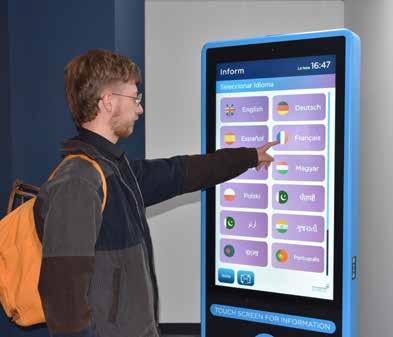
Kathryn added: “We recognise that language barriers can be a significant
challenge and there are a lot of customers for whom English is not their first language. We want to do everything we can to make their journey as smooth and enjoyable as possible.
“Using data from the Office for National Statistics, we were able to determine the most common languages used by people along our network and look forward to being able to provide updates for customers in myriad of languages, from Polish to Punjabi.”
The installation of the new technology will help to improve the information available to customers and, says TPE is “another step in its commitment to delivering a consistently high journey experience for customers across its network.”
The first of the Liverpool City Region’s new, publicly owned, battery powered trains has begun final testing.

Once testing is complete, the trains, which deliver an 80% reduction in energy consumption, will be the first battery powered trains of their type in the country to operate in passenger service, cementing the city region’s place at the forefront of pioneering rail technology and innovation.
Mayor Steve Rotheram said: “This is not only a massive milestone for our area, but for the entire country, as our new publicly owned, battery powered trains enter final testing.

“Our trains will be the first of their kind in the country, fitted with pioneering battery technology that will help us to significantly reduce our carbon footprint and pave the way for a cleaner, greener, and better-connected
London-style transport network. This is the gold standard of public transport – and it’s the very least that our residents deserve.
“We are enormously grateful to passengers for their patience during this final testing stage but I can guarantee them that their new battery powered trains – and their brand new station – will be worth the wait!”
It follows the launch of the region’s new £500 million fleet earlier this year. Designed in consultation with the public, the new fleet is among the most sophisticated and accessible in the country featuring slide step technology and other smart features, as well as additional space for wheelchair users and prams.
The battery technology, which enables the trains to run without the need for a third rail, will initially be fitted on seven of the city region’s state-of-the-art class 777 trains.
A railway manager who’s gone without a haircut since before the first coronavirus lockdown has had his luscious locks cut off so he could donate them to make wigs for children with cancer.

Stuart Hughes, a senior programme manager for Network Rail in Birmingham, took his seat in the salon on 14 July – the first time in over 41 months.
These are now being donated to Hereford-based charity The Little Princess Trust*, which provides real hair wigs free of charge to children and young people who have lost their own through cancer treatment or conditions like alopecia.
Making each wig costs around £550 so Stuart initially set out to raise that too, but far exceeded that amount before any scissors were snipped.
Stuart said: “I have never had long hair before and during the first lockdown I just thought I would let it grow out a bit longer than usual. As time went by a number of people said that if I ever get my hair cut I should donate it, so I looked in to it.
“The biggest demand is for hair over 12 inches long so I was delighted to have 10 ponytails around 18 inches long cut off last Friday! Whilst I may miss the long hair a little bit, I am really pleased that it will go to someone for whom it will make a really positive difference.”
Siemens Mobility and its partners have come together to raise tens of thousands of pounds for a local charity with its inaugural Goole Cricket Day, held on Friday 14 July.


The event at Goole Town Cricket Club featured teams from Siemens Mobility and its partners including Angel Trains, GMI Construction Group, Knorr-Bremse, Porterbrook, Wabtec, and West Midlands Trains.
More than 650,000 passengers have already saved themselves more than 10 years of total journey time during the first 100 days of operation of the Luton DART.
The Direct Air-Rail Transit system, which whisks travellers between Luton Airport Parkway Station and the airport terminal in under four minutes, opened on 27 March and reached its 100-day milestone on 5 July.

Serving travellers who have arrived from more than 129 different stations on the national rail network, the busiest day on the Luton DART saw it carry more than 10,000 passengers and handle more than 18% of all air passengers using the airport.
“We are very pleased with the Luton DART’s early performance which is matching the ongoing post-pandemic recovery in passenger numbers seen at our airport,” said Councillor Javeria Hussain, Chair of Luton Rising, the Luton Council-owned company that owns the airport and built the Luton DART to significantly improve the passenger experience.
“More than 740 passenger surveys have been completed, which alongside more than 1,100 customer comments consistently report the experience provided as great. The service has achieved 99.8% reliability.”
Since opening, each of the two Luton DART shuttles has travelled 36,000km, more than an entire circumference of the earth, and carried passengers uphill a distance of exceeding 11,000km, equivalent to over 1,000 times the height of Everest.
Nick Platts, Luton Rising managing director, said: “The newly-launched Luton DART enables a total journey time from the capital of just 32 minutes when passengers combine it with the Luton Airport Express fast train service out of London St Pancras.
“Every passenger using London Luton Airport and the Luton DART means more support for frontline services in Luton and vulnerable people in particular who most need the help we fund through our unique £7.4 million annual contribution to local voluntary, community and charitable organisations.”
Each of the eight participating teams made a donation to take part, with the event raising a total of £21,000 to be shared across seven local charities; Goole and Snaith Imagination Library, Two Rivers Community Pantry, Castaway, Friends of Oakhill, The Conservation Volunteers, Goole Pride and Goole Boxing Club.
The final was contested between Porterbrook and Angel Trains with Porterbrook eventually emerging as the winner.
The winning team received a trophy crafted by a member of the Siemens Mobility Traction Drives Team, to showcase creative and technical skills.
Siemens Mobility is investing up to £200 million in developing a train manufacturing plant in Goole, which will create up to 700 skilled jobs, as well as up to 1,700 in the supply chain and 250 during construction. Trains for the UK market will be built at the new factory, starting with new Piccadilly line Tube trains for Transport for London, with manufacturing due to begin next year.
The factory will be complemented by a neighbouring research, development and
innovation cluster and co-located supplier facilities, establishing Goole as a centre of excellence for rail technology in the UK.
Siemens Mobility's Simon Rennie, head of digital for Rolling Stock and Customer Services UKI and co-ordinator of the charity cricket match, said: “One of the most satisfying things about developing our pioneering rail facility in Goole has been the extent to which we’ve been able to engage with, and become part of, the vibrant community here.
“The Charity Cricket Day was an opportunity to come together with our customers, partners, suppliers and their teams to have fun and raise important funds to give something back to that community. A huge thank you to Goole Cricket Club for providing a fantastic venue as well as their sporting support.
“Despite the rain, it was a brilliant day, and I think we had a few players channelling the spirit of The Ashes!”
© London Luton Airporthttps://www.railwaymission.org/ donate/donate-online



The Railway Mission Chaplaincy service is a vital support network for railway workers across the UK, providing emotional and spiritual care for those who work on the railways and their families. From listening to personal problems to offering guidance and comfort during difficult times, the Railway Mission Chaplaincy service is there to provide compassionate care and support to those in need. By donating to the Railway Mission Chaplaincy service, you can help ensure that this important service continues to be available to railway workers and their families, providing them with the emotional and spiritual care they need during challenging times. Your donation will help provide funding for chaplains to be available 24/7, ensuring that they are always there when needed, whether it be at depots, railway stations or even at home.
Your support can make all the difference to the lives of those who work on the railways and their families. So why not make a difference today and donate to the Railway Mission Chaplaincy service? Every pound you donate goes directly towards providing support and care to those who need it most.

Join us in supporting this important cause and help make a difference in the lives of railway workers and their families today!
In March 2022 more than a thousand people made their will using the free will-writing offer from partners in rail - the Railway Mission and RBF.

This March 2023, to extend the opportunity, we have again partnered with will-writing specialists Bequeathed to give people working in rail and their families the chance to make their Will For Good, for free. This joint initiative is kindly supported by the Retired Rail Officers Society (RROS).
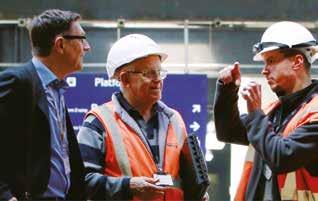
It’s easy to make your free Will For Good. Answer some questions in an online interview, then book an appointment through Bequeathed to receive legal advice. Your appointment can be via online video call or telephone, or at your home.
The process is easy and, as long as you have an email address, can be used by people of any age or ability.

In these uncertain times, we need your help more than ever.
Regular donations through Payroll Giving are the easiest way to support any UK charity, good cause or place of worship. Donations are taxfree so a £5 a month donation will cost you no more than £4. Talk to your payroll department and start to support your Railway Chaplains.
Are you looking for a way to make a meaningful impact on the lives of railway workers and their families?
Consider supporting the Railway Mission Chaplaincy service!
The much-loved centrepiece to last year’s Commonwealth Games – Ozzy the bull – has been officially unveiled in his new home at Birmingham New Street station.
The huge moving mechanical sculpture has been installed on the station’s concourse for thousands of people to admire in the heart of Birmingham and at the heart of Britain’s railway network.
It’s nearly a year since Ozzy – then known as the Raging Bull – endeared himself to millions across the globe when he formed the climax of the Birmingham 2022 Opening Ceremony alongside 50 women chain makers to tell the story of the West Midlands’ industrial past.
On the morning of Wednesday 26 July, more than half of the original cast members helped unveil the 10-metre-high beast, which has

been named after Birmingham music legend Ozzy Osbourne.
Watching on proudly was his wife, Sharon Osbourne, Ozzy’s older sister Jean Powell, and Birmingham 2022 Gold medal winning super heavyweight boxer Delicious Orie.
The unveiling followed an overwhelming public vote for the Raging Bull to be renamed Ozzy – in honour of the Black Sabbath frontman who appeared as a surprise performance in the Games’
closing ceremony last year. Ozzy the bull’s new home at New Street has been made possible by Network Rail and the West Midlands Combined Authority.
Both organisations worked together with the Birmingham 2022 Games organisers to secure the future of the iconic artwork, when it was removed from public display last September.
Peter, Lord Hendy of Richmond Hill, and Network
Any rail operator can now use WhatsApp and Messenger for free to communicate directly with passengers, thanks to the launch of a new service – Journey Alerts.

Journey Alerts offers all operators free use of the global messaging channels to send real-time journey information and incentives to passengers, boosting customer satisfaction and loyalty. The technology is already being used by rail operators including East Midlands Railway, South Western Railway, c2c, and LNER.
The launch of Journey Alerts by media company Zipabout comes months after National Rail Enquiries terminated its popular ‘Alert Me’ information service, leaving rail passengers unable to use WhatsApp and Messenger to access journey updates. Zipabout had been sending two million messages each month to keep passengers in the loop before the termination of ‘Alert Me’ in June. Passengers using National Rail Enquiries are currently only able to access real-time information by making a phone call,
requesting an SMS, or scrolling Twitter. Journey Alerts has been developed using input from the Department for Transport (DfT), rail operators, and local authorities, and is being delivered in a free model thanks to Zipabout’s partnership with Meta. The service can stand alone or integrate into other channels, including operator Apps, to open a two-way conversation with customers, supercharge existing operator customer experience programmes and free up customer service teams.
Using a simple QR code or link to opt in, Journey Alerts gives passengers real-time information tailored to their individual journey on the messaging channels they already use. The service can also send personalised loyalty rewards and retail offers from wellknown brands, at absolutely no cost to the operator.
Hollye Kirkcaldy, chief commercial officer at Zipabout, said: “Having to make a phone call or scroll through Twitter just to get real-time updates on your journey is outdated and infuriating for passengers already struggling
Rail chair said: “We are really proud to have given Ozzy a new home at Birmingham New Street for thousands of people to enjoy, right at the heart of Britain’s railway network.
“A huge amount of work has gone into making this happen, by many, many people over many months. Ozzy will now not only be a reminder of last year’s unforgettable summer of sport, but also a new icon for the city and its future.”
with the disruption caused by strike action this summer. Journey Alerts puts the right information directly into the hands of the passenger when they need it, without using yet another app or frustrating chatbot.
“It’s a service for forward-thinking transport operators who can see the financial benefits of satisfied customers at a time when passenger dissatisfaction with rail services is high, and thanks to our relationship with Meta, we’re delighted to be able to offer the technology for free.”
Trainline has launched its latest campaign to attract US tourists onboard trains while they are visiting the UK and Europe, by creating a rail style guide with TV personality and professional stylist Tan France to mark the summer tourism peak.
With a launch event at an exclusive Los Angeles hotel, ‘Trainleisure: A Style Guide to Europe’ provides 10 specially curated and fully styled looks to wear while travelling to some of the most popular destinations for US tourists in

the UK, France, and Italy.
This is the third instalment in Trainline’s direct promotion of UK and European rail to the American market this year. It follows a competition launched in partnership with David Hasselhoff, and an immersive event held at Grand Central station in New York.

A survey of 1,000 Americans commissioned by Trainline found that up to 29% were considering a trip to Europe in the coming year. With driving more firmly embedded in American culture than train travel, more than half of those
surveyed (55%) were concerned at the idea of driving on the ‘wrong’ side of the road during their visit to the UK – making them prime candidates for becoming rail passengers, if we inspire them to take the train instead of drive.
Trainline data shows the top 20 most popular European rail routes for US tourists includes London-Edinburgh, London-Paris, LondonManchester, and London-Oxford.
Fashion designer, Tan France said: “Having grown up in the UK, we always love to travel through Europe by rail. You can see multiple regions on a single trip without feeling rushed — after all, the journey is part of the destination.
“In collaborating on Trainleisure: A Style Guide to Europe with Trainline, I wanted to offer tips on how to combine style with comfort for travellers hoping to look just as chic in transit as they do out on an Italian wine tour or French Riviera sunset cruise.”
Pete Wade, chief commercial officer of Trainline said: “No one knows style better than Tan France, and no one knows European travel better than Trainline. We’re eager to be partnering with Tan and sharing our top recommendations on what to pack and where to visit this year.
“Helping people find the most affordable and convenient train journey is in Trainline’s DNA and using style to help our American visitors gain an authentic European experience has been a fun twist.”
Clean as a whistle
Northern is developing an app that will let its team of over 500 train presentation operatives know ‘to the minute’ when any given train on their network was last cleaned.
It is part of a new plan led approach to the ‘basic cleans’ that take place in carriages while trains are waiting at stations during passenger service.
Train presentation staff will be able to easier-identify which trains are most in need of attention, based on real-time data, rather than tackling them on a ‘first come, first serve’ basis.
All in a day's work
Power workers weeded the railway track at the world’s oldest working electric railway on Brighton seafront, to help keep summer train excursions on track.
Fifteen network planners from UK Power Networks spent a day keeping ragwort and other invasive weeds at bay for Volk’s Electric Railway on Madeira Drive through Donate a Day, which gives staff two paid days leave each year to work on local volunteer projects. The group weeded half a mile of railway track between the aquarium and the mid-way station.
On 31 July, representatives from Network Rail and GWR joined the Secretary of State for Transport to open Bristol’s first new railway station in 96 years.
The £5.8 million Portway Park & Ride station between Shirehampton and Avonmouth forms part of the West of England Combined Authority’s wider plans to enhance the local rail network through the ambitious MetroWest programme.
Portway Park & Ride is the first new railway station to be delivered as part of the MetroWest programme, and the first new station to be launched in Bristol since Parson Street station, in 1927.
The first of the 94 new trains for Transport for London’s (TfL’s) Piccadilly line, built by Siemens Mobility, has arrived at the Test and Validation Centre in WegbergWildenrath, Germany.
The first nine-carriage train came off the production line in Vienna at the end of July before being transported to the Test and Validation Centre.
The-state-of-the-art train will be put through rigorous tests including acceleration and braking functionality, noise, and vibration trials, as well as testing all the equipment onboard, both hardware and software, and functional tests of the interfaces the train will have with off-train equipment.
London North Eastern Railway (LNER) has invited startups from across the UK to showcase their cutting-edge technologies aimed at making rail travel even better, offering the opportunity to share their tech solutions to challenges facing the industry.
Six companies reached the final stage of pitching at this year’s FutureLabs, LNER’s flagship annual accelerator programme. At a live demonstration event at York St John University attended by almost one hundred rail industry leaders and hosted by tech journalist and expert Mary-Ann Russon, they presented their pioneering ideas having addressed at least one of four key objectives:
• To encourage passengers to choose rail.
• To strengthen the sustainability of the rail network.
• To create a frictionless journey for customers.
• To explore emerging technology that pushes the rail industry to the next level.
LNER’s FutureLabs enables ambitious startups and SMEs to join its 12-week programme where they receive mentoring and funding opportunities to develop and scaleup technology solutions. The programme is now in its fourth year thanks to its continued success.


This year’s ‘Cohort Winner’, announced at the Demo Day, is Automedi. The project helps businesses turn plastic waste into usable products within minutes through 3D printing. This follows on from the success of last year’s FutureLabs, which helped LNER to repurpose unused estate to deploy algae bioreactors to capture carbon.
SpatialCortex Technology was awarded the 2023 ‘Collaboration Prize’ accolade, which recognises outstanding collaboration with the LNER teams. The project uses wearable technology as a bio-mechanical solution for manual handling injury risk assessment and management for rail workers. The team demonstrated the testing of its sensors with catering teams onboard LNER’s trains and analysed risks of musculoskeletal impact.
Frances Walker, head of digital experience strategy at LNER, said: “LNER FutureLabs is an important pillar in our strategy to put technology at the heart of our operations and our customers’ journey. We are really proud to support startups in providing the real-world opportunity, experience, and knowledge needed to bring these innovators’ ideas to life.
“Implementing new practices and ways of thinking plays a huge role in driving forward the rail industry. We are incredibly proud of the results garnered by the programme to date, and we are delighted to continue this work.”

A tribute to a World War Two railway hero has been unveiled at one of Northern’s East Yorkshire stations.
The train operator, alongside the Yorkshire Coast Community Rail Partnership has honoured courageous ticket collector Ernest Barker with a blue plaque.
Northern and members of the community, including the mayor and deputy major of Bridlington, veterans' groups, children from nearby primary schools, and Yorkshire Coast Community Rail Partnership attended a celebration at Bridlington station, where the tribute was unveiled.


The heroic railway worker saved lives
by battling a fire after a bomb hit the station yard close to a train carriage full of ammunition.
Barker’s brave act was carried out 82 years ago on 11 July 1941, as an unexpected raid by a German bomber caused devastation on nearby Hilderthorpe Road.
Five people died as blasts destroyed buildings.
But, just a few hundred yards away, another bomb was close to causing more carnage. Bridlington railway station yard was also hit – and a fire broke out on a train carriage full of ammunition.
Barker ran to the scene and fought the blaze as his colleagues worked on the fires nearby and thankfully extinguished it, saving the lives of the many people in the nearby buildings.
He became one of the first people to receive the new George Medal. His story has come to light thanks to the research of local historian Richard Jones.
Tony Baxter, regional director at Northern said: “We’re so pleased to be able to pay tribute to a local hero and the heritage of Bridlington station.
“I’d like to thank everyone for attending the event and we are delighted to be a part of this community project.”
In a visit to Devon on 3 July, Transport Secretary Mark Harper attended Dawlish station to open a brand-new railway station at Marsh Barton, and mark the completion of the £82 million sea wall, built to protect the coastal rail route.
The new, rebuilt sea wall will protect the safety of local passengers from extreme weather conditions along the coast. It has been completed in two phases, with the latter stage protecting the Grade 2 listed Dawlish train station.
Transport Secretary Mark Harper said: “I am delighted to see the completion of two major projects today, delivering a government commitment to improve a vital rail route for passengers in the South West.
“These projects demonstrate a government


that is delivering our promises, investing in vital infrastructure and improving transport connections to help grow the economy.”
The work in Dawlish forms part of the £165 million South West Resilience Programme and delivers a more resilient railway after devastating storms in 2014 damaged the tracks beyond use for eight weeks and disconnected passengers from the network.
The completion of the works marks a major milestone for the programme and will offer a promenade and new public areas for the local community. Ongoing work by Network Rail also continues to develop a new, accessible footbridge with lifts at Dawlish Station.
Further cliff protection work, to deliver two additional phases of the programme, continues at pace including a rockfall shelter at Holcombe, along the coast from Dawlish.
Michelle Handforth, regional managing director of Network Rail’s Wales and Western region, said: “Working with world-leading engineers and with funding from the government, we’ve been able to protect the railway line and town of Dawlish for generations to come.
“I’d particularly like to thank the Dawlish community for their patience and support while the construction took place close to their homes and businesses over two-and-half years.”
Northern is working with more than 40 of its staff to come up with the best way to support its neurodiverse employees.
Around one in seven people (more than 15% of people in the UK) are neurodivergent, meaning that their brain functions, learns, and processes information differently.
The train operator has set up a new working group alongside a new policy to support people with conditions such as autism, attention-deficit/hyperactivity disorder (ADHD),

dyslexia, dyspraxia, and Tourette's syndrome. The policy pledges to provide support and guidance for colleagues with neurodivergent conditions while the working group has been set up to understand people’s needs and how best the train operator can support them.
Lisa Leighton, people director at Northern, said: “Around one in seven people in the UK are thought to be neurodivergent, which means of our 7,000 colleagues, as many as 1,000 could be affected.
“With this working group of colleagues, our
aim is to continue to develop a culture where everyone feels included and valued and make Northern a great place to work for everyone, recognising, understanding and appreciating individual needs.”
Thomas Case, who works as a train presentation operative at Northern and has autism, said: “The neurodiversity policy is so incredibly important to have. The workplace can be a scary place for those with neurodiverse issues and the policy helps managers and colleagues gain an understanding of the neurodiverse issues a colleague may have, and why it's important that they get the right support.”
Northern also has an equality, diversity, and inclusion policy, outlining its commitment to developing an inclusive working environment and being truly representative of the communities it serves.
Earlier this year Northern was highly commended for the Best in Inclusion category at the Greater Manchester Good Employment Awards.
The Greater Manchester Good Employment Charter is a voluntary scheme aimed at raising employment standards across the area. It champions commitment to equality, fair pay, and giving employees a say in how their workplace is run.
Paul said: “This was a fabulous team effort with the Network Rail East Midlands team coming together and working collaboratively with our delivery partners to plan and undertake this three-day challenge, for a sadly missed friend, colleague and a great cause, Cancer Research UK.
“Fran was a popular member of the team. She was a positive and supportive influence on all those who worked with her across Network Rail and the supply chain. This is our way to celebrate this unique individual, who touched so many people in a positive way.”
Colleagues from Network Rail and other industry partners cycled from London St. Pancras to Sheffield in just three days to raise money for Cancer Research UK.

In memory of Network Rail colleague, Fran Johnson, 20 cyclists from Network Rail’s East Midlands route, along with industry partners, took on the challenge of cycling 180 miles from London St. Pancras to Sheffield over three days.
On Thursday 22 June, the journey began

at St Pancras, with the cyclists covering approximately 75 miles to Wellingborough. The second leg covered a similar distance from Wellingborough to Derby, with the final 40 miles from Derby to Sheffield being completed on Saturday 24 June.
Over £22,000 has been raised for Fran’s family’s chosen charity – Cancer Research UK. Paul Cater, senior portfolio manager at Network Rail’s East Midlands Route, was one of the 20 cyclists who took part in the challenge.
When asked about his first-hand experience of the 180-mile bike ride, Paul added: “We were lucky, the English weather was on our side, apart from a 30-minute torrential downpour at the very end of the first day, where everybody was soaked to the skin in seconds. The final day’s ride commenced with more colleagues and Fran’s family joining the team to ride the first six miles from Derby to Duffield station, where we received a fantastic welcome from the Cancer Research UK team and cream scones!
“It was then onto the final leg over the Derbyshire hills to Sheffield station. All in all, it was a truly great experience, and one I am proud to have been part of.”
As 2023 flies by, the RailStaff Awards creep closer and closer. On Thursday 30 November, the great and good of the rail industry will descend on Birmingham’s NEC to honour the achievements of its exemplary employees. And while they’re the individuals we’ll all be celebrating, there are a few more important people to mention.
We present to you, your host for the evening and the RailStaff Awards Judges!
This year’s ceremony will be hosted by none other than TV and Radio Broadcaster, Gethin Jones.



A family favourite, Gethin started his career on Wales’ S4C before taking on an iconic role as a Blue Peter presenter. Gethin’s stint on the time-honoured show saw him break four world records, complete three death-defying tasks, and fulfil the ambition of a lifetime by flying with the Red Arrows. In his three years as a presenter he visited 32 countries before deciding the time was right to move on.
Since then, Gethin has appeared in countless high-profile shows including Strictly Come Dancing, where he reached the semi-final in 2006, BBC1’s Morning Live, as well as the One Show and Celebrity Masterchef.
In 2022 he presented coverage of the first visit of King Charles III to the Welsh capital, Cardiff.
Gethin made his radio debut on BBC Radio 5 Live in 2008 and has gone on to present shows on Heart FM, The Hits Radio, and BBC Radio Wales. A self-confessed rugby anorak, he hosted a Welsh language rugbythemed quiz show in 2019, as well as the official podcast for this year’s Rugby World Cup.
Nominations can be made at: www.railstaffawards.com/ event/2023/nominate

The rail industry covers countless job roles which are all represented at the RailStaff Awards and individuals at all levels are eligible in the event’s 18 categories. The task of deciding on the winners goes to a judging panel of 12 individuals, plucked from throughout the industry. The panel includes:
• Glynis Appelbe - HR Director, G&W UK/Europe Region/Freightliner
Glynis Appelbe joined G&W UK/Europe region in March 2016 as HR Director – UK/Europe. Prior to this she was the Head of HR for a FTSE listed global diversified mining company.
• Julie Bentley - CEO, Samaritans
Julie has been a charity CEO for over 19 years. She has led some of the UK’s most well-known charity names including Action for Children, Girlguiding, Family Planning Association and the Suzy Lamplugh Trust.
• Fiona Brunskill - Chief People Officer, Transport for London
As Transport for London’s Chief People Officer, Fiona’s focus is on making sure that TfL is a truly great place to work, for everyone.
• Karl Gilmore - Rail Infrastructure Director, Transport for Wales
Karl is responsible for delivering the South Wales Metro programme and other infrastructure projects across Wales.
• Jo Gretton - CEO, Telent
Jo Gretton is Telent’s Chief Executive Officer responsible for leading the company to deliver excellent customer service, continued growth and ensuring that Telent is a great place to work.
• Edward Hodson – Chair, IOSH Railway Group
A Chartered Member of IOSH, Edward has experience of working in rail, manufacturing, and law.

• Amy ‘Bessie’ Matthews - Rail Person of the Year Winner 2022
Amy ‘Bessie’ Matthews is a Shunt Driver for Freightliner and our Rail Person of the Year Winner 2022!
• Rob Morton - Managing Director Route Services, Network Rail
Rob is Managing Director Route Services at Network Rail. He specialises in leading, growing and delivering turnaround in large operational buisnesses for private and publicly funded organisations.
• Bonnie Price – Chairwoman, Young Rail Professionals
Bonnie is a consultant for Egis in the UK and the Chairwoman of Young Rail Professionals. She has experience with Southeastern, TFL, Crossrail/MTR, Chiltern railways, and Network rail.
• John Sheehy - CEO, Transport Benevolent Fund CIO
John joined TBF in 1998 and loves working in the charity sector. He knows the help and support that TBF provides to public transport workers and their dependents makes a significant difference in times of need, hardship, and distress.
• Richard Thorp - Director of Engineering & Sustainability, High Speed 1 Ltd
Richard is a Chartered Engineer, with over 25 years’ experience in delivering and developing asset management capabilities for both UK main-line and high-speed railways.
• Alan Wilson - Managing Director, Train'd Up
Alan joined Train’d Up as Managing Director in June 2022. Responsible for managing multiple teams within the organisation, he knows how important well managed teams are in driving standards and achieving success.
The big event draws closer but it’s not too late to book your ticket or nominate a RailStaff Superstar. Visit www.railstaffawards.com for more information.
We’ll see you on the dancefloor!

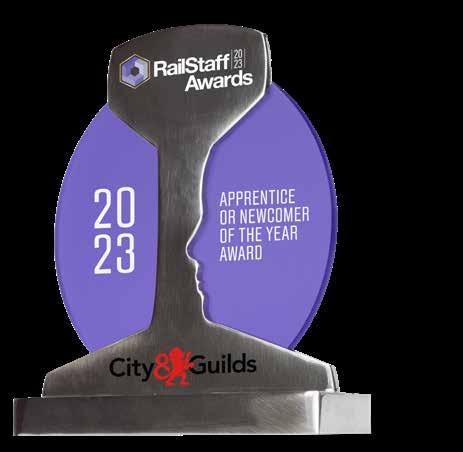

In an industry that requires thousands of additional workers in the coming years, new employees are a prized resource for all rail companies, whether they’re fresh out of education or making a move later in their careers.
The Apprentice or Newcomer of the Year award is intended to recognise the outstanding contributions of those who are new to the industry, or who have some time under their belt but have chosen to become an apprentice. These individuals show exceptional skill, tenacity, and professional achievement.
City & Guilds is proud to sponsor this year’s Apprentice or Newcomer of the Year award. For almost 150 years City & Guilds has worked with people, organisations, and economies to help them identify and develop the skills they need to thrive. It understands the life changing link between skills development, social mobility, prosperity and success so everything it does is focused on developing and delivering highquality training, qualifications and credentials that lead to jobs and meet the changing needs
In the rail sector, City & Guilds does this through City & Guilds Intertrain, it’s NSAR approved rail training business – the largest and marketleading railway training and assessment provider in the UK.
City & Guilds is a Royal Chartered Institute and a registered charity. It invests in expanding and enhancing its solutions across all of its brands, to meet the changing needs of organisations and industries. Through its City & Guilds Foundation it focuses on high impact social investment, recognition, and advocacy programs which remove barriers to getting a job, celebrate best practice on the job, and advocate for jobs of the future.
The Apprentice or Newcomer of the Year award is an amalgamation of two categories previously presented at the RailStaff Awards. Bob Bryce of Govia Thameslink Railway (GTR) was named Apprentice of the Year at the 2022 Awards. Bob became an inspiration for others across the
world after completing an NVQ level 3 apprenticeship course at the age of 76.
The course he undertook involved producing project work, task analysis, and initially Mathematics and English tests, all of which he passed despite leaving school over 60 years ago.
Last year’s Graduate or Newcomer of the Year prize was handed to Louis Szymanski of D2 Rail. Since joining D2 Rail in August 2020, he has made himself an integral part of both the D2 Rail Project Controls Team and the TransPennine Route Upgrade (TRU) West Alliance Planning & Controls Team.

On top of this, he also founded the Equality, Diversity and Inclusion group at D2 Rail, and volunteers on the TRU West Equality, Diversity and Inclusion
group as an ED&I Champion. His goal is to help make strides in equality, diversity, and inclusion within the industry.
City & Guilds sponsored last year’s Graduate or Newcomer Award and Andy Moss, managing director of Employer Solutions at City & Guilds Group, presented the award.
"At City & Guilds, we’re all about skills and jobs,” said Andy. “In many ways, the RailStaff Awards embody the work we do. It’s about celebrating the people coming into this amazing sector where they can build great careers.

“What I love about being part of this is the diversity of the candidates coming through and seeing people from a wide range of backgrounds succeed. Rail is a great example of how you can build a really exciting future for yourself.”
www.cityandguilds.com

With passengers returning to rail, freight volumes growing, and the rail network continuously expanding, rail managers face an increasingly complex job. Keeping services running smoothly is a joint responsibility, but the task of meeting budgets and deadlines falls on their shoulders. It’s no easy task, and the RailStaff Awards recognises these hard-working heroes.
The Rail Manager of the Year Award is reserved for outstanding individuals: true professionals with exceptional leadership skills, who go above and beyond for their team.
Great Western Railway’s (GWR) Carys Thomas took the award in 2018. Then a former duty station manager and graduate of the company’s Aspire apprenticeship scheme, Carys’ colleagues nominated her for the significant impact she had made at Bristol Temple Meads station.
When she started at the station, staffing levels were at 67%, with only two duty station managers in post and paperwork almost non-existent. Although there had been improvements, there were still large barriers between managers and frontline colleagues, with the result that staff felt unsupported and unheard.
Carys was determined to change this, working with colleagues to document the main issues and acting tirelessly to influence change.
Having identified the problems, Carys demonstrated the large gaps in documentation that needed to be filled to be operationally and occupationally compliant. She arranged for regular staff meetings and briefings, and organised training and workshops.
As a result of this close work with colleagues, staffing levels were increased to 96% and sickness levels reduced to a level never reached before.
Carys now works as an operations compliance manager, a role she has held for around five years. She currently also gives up her time as an accessibility volunteer and supports the accessibility team in delivering ‘Try a train’ railway confidence trips to accessible schools and communities.
The additional exposure that the RailStaff Awards generated, have helped Carys along in her career, she says.
“After winning the award, I was congratulated by a number of people I hadn’t previously met, so it definitely helped to expand my network. Along with the hard work I carried out at Bristol Temple Meads, building the compliance processes and systems/auditable records, the Award has definitely had a positive impact.”
So, what advice does Carys have for those in the rail manager role?
“My biggest piece of guidance would be to communicate with people irrespective of grade and involve them in decisions early on, explaining the reasons for things,” she says.
“People are quick to make assumptions without knowing the background of the request or process. Talking through things early on can result in better relationships and help to avoid grievances.”
The Rail Manager of the Year Award celebrates the great work and achievements of those who have taken on very demanding leadership roles - people who understand what the rail industry needs and who add real value to the growing number of projects and organisations required to create a better performing network.
If you know an exceptional individual who’s worthy of recognition, nominate them today!


Engineers bring the vision and knowledge which drive the rail industry's projects and systems. Without engineers, there would be no railway –it’s as simple as that. That’s why, of all the RailStaff Awards’ accolades, the Rail Engineer of the Year Award is one of its most prized.
In 2018, Scott McKavett, a principal engineer at Network Rail, was named Rail Engineer of the Year for a project that led to savings of £4 million.
Between 2017 and 2018, Scott, then a senior project engineer within Network Rail’s Infrastructure Projects delivery arm, led the development and delivery of Merseytravel’s gauging, passenger train interface, and train lengthening schemes to enable the introduction of a new fleet of trains.
Scott oversaw the feasibility, option selection, design, and delivery of gauging and passenger train interface improvement works across the whole of the Merseyrail network.
With the support of colleagues, he also challenged the existing computer vehicle profiles for the Class 153 and 155 and provided leadership to reassess and
update the vehicle profiles, with support from specialist supplier DGauge.
Scott also led the production of a paper which highlighted the challenges and inefficiencies created with the historic models. The updated profiles are now utilised across the rail industry by gauging engineers, designers, and contractors.
Since taking home the award, Scott and his team have successfully finished all the gauge clearance and passenger-train interface improvement works on the Mersey Rail network associated with the introduction of the Class 777’s.
“I was very proud of my involvement with this project and this was a major contributor to winning the Engineer of the Year award,” he says. “It was great that through infrastructure works, clever rolling stock design, and a passionate client in Merseytravel, we made huge improvements to the passenger-train interface.”
Scott and his team have also completed the Peak Forest project at Buxton which allows longer freight trains to and from the quarries at Hindlow and Dowlow, keeping lorries off the local highway network.
“Although extending a run-round sounds simple, there was an awful lot of civil engineering works in the form of earthworks and drainage, and strict
environmental controls as the run-round extended into a former landfill site. It was quite shocking to see the number of plastic bottles which were excavated and still looked like new after over 40 years in the ground. It opened my eyes and changed my attitude towards recycling at home.”
In the past few years, Scott has been involved with development projects in the North of England, initially on the Cumbria Coast, and then on the Northern Powerhouse Rail project.
“It’s great to be involved with such a large project and, as it’s still in its infancy, there are real opportunities to influence the final outcomes, embrace innovation, and apply all the lessons and best practice I’ve learnt in the past. I am passionate about bringing innovation, new technology, and ways of working to the railway, but I am also keen we don’t lose sight of the things we already do well and continue to improve in these areas.
“Winning the Rail Staff Engineer of the Year Award certainly raised my profile and made people more aware of what I do. I’ve never been one to shout from the rooftops about my work, but I’m really grateful for the recognition and the exposure that the RailStaff Awards gave me.”





In the rail industry, major projects are regularly delivered on time and on budget. The task of driving them through, as well as keeping an eye on budgets and deadlines, lands on the shoulders of the industry’s project managers. They’re a confident, focused, and hard-working bunch, and in previous years the RailStaff Awards has shone a light on their immense skill and can-do attitude.
Kirsty Devlin was a project manager at ScotRail when she was honoured with the Project Manager of the Year award in 2018. She was nominated by her colleagues for her role in introducing 10 new Class 365 trains in record time.
Kirsty oversaw the launch of the new trains, which were acquired from Govia Thameslink Railway as a contingency due to delays in the delivery of the new Class 385 trains. In just three months, her team got the new trains gauge cleared, ready for passenger service, and introduced to rail services in Scotland.
Kirsty’s skill as a project manager may have bagged her the award, but she showed exceptional modesty on the night, and was keen to point out all the team players who brought the new fleet into service so quickly.
“It was a real team effort,” she said after receiving the award. “Between Eversholt Rail, Network Rail, Knorr-Bremse – SNCLavalin did a lot of the support work – everyone worked really well together as a team to deliver it.
“I tried to pull it all together but I’m not taking all the credit for doing all the work. It was a big team effort.”
Since the 2018 Awards, Kirsty’s career has gone from strength to strength.
“My win in 2018 definitely helped my professional reputation and career. I was promoted to head of projects in 2019 and took on the Programme Management Office (PMO) team in 2020 on an interim basis. I was made permanent in February 2022, and I’m now head of projects & PMO at ScotRail.”
It’s a role that tests all the skills and experience Kirsty has picked up in her years as a project manager but, as she’s already proven, she’s more than up to the challenge.
“As head of projects & PMO I manage a team of project managers and project control managers to ensure we deliver projects for ScotRail on time and on budget to the scope and quality our customers need.
“We work to deliver many varied projects like station enhancements such as at Motherwell and Aberdeen or ticket gate installations to generate revenue; new trains introductions; projects in depots like shore supply or enhancements to stabling facilities; or building complete stations, which we did for
the first time with Robroyston station.

“A typical day for me involves a lot of Teams meetings! There are project team meetings with the PM’s and PCM’s or meetings with external and internal stakeholders or design teams about project scope and finance and meetings with Transport Scotland, our key stakeholder. I try to get out and about on a site visits when I can, and this involves me travelling all over the country. This is the most enjoyable part of the job and no two days are
the same, I’m very lucky to have a great job I love.

“Delivering these projects can be a major challenge, but that makes it all the more interesting.”
This is the type of attitude that the RailStaff Awards celebrates! If you know someone with the same determination and dedication, then why not nominate them?
Just visit www.railstaffawards. com to fill in a nomination form. It only takes a few minutes but could make a huge difference to someone who deserves it.



It is an often-underappreciated service that deserves recognition for its significant impact on the well-being of railway workers and the industry as a whole. This unique and invaluable service provides emotional, psychological, and spiritual support to those working in the railway industry, ensuring their well-being, and contributing to a safer and healthier work environment.

Railway Mission Chaplaincy is a specialised chaplaincy service that operates within the railway industry, catering to the diverse needs of its workforce. The chaplains, who are individuals with a strong understanding of the railway industry and its challenges, offer a listening ear, guidance, and pastoral care to railway workers and their families. They provide support in times of crisis, loss, or personal difficulties, offering a safe space for individuals to express their emotions and find solace.
In an age of advanced technology, artificial intelligence, and the application of scientific knowledge for industrial development, it's easy to overlook the human element that keeps the wheels of industry turning. The railway industry relies heavily on dedicated people who work tirelessly to ensure the smooth operation of the railway, the movement of freight and the safety of passengers. While this human element will continue to be augmented by scientific advances, the human element will continue to be central to the development of the industry.
The industry plays a crucial role in the modern world, connecting people, goods, and ideas across vast distances. It is a complex and demanding sector, where safety, efficiency, and the well-being of its employees are of paramount importance. Among the various support systems in place for railway workers, is one that plays a significant role, but that often goes unnoticed – the Railway Mission’s Chaplaincy service.
One of the key aspects of Railway Mission Chaplaincy is its availability, ensuring that support is accessible to railway colleagues when they need it. The railway industry operates 24/7, and workers often face demanding schedules and stressful situations. Having chaplains who are readily available to provide support and care is invaluable, as it fosters a sense of community, trust, and wellbeing among the workforce.
The role of a chaplain extends beyond crisis intervention and individual support. Chaplains actively engage with railway staff, building relationships and promoting a sense of camaraderie within the industry. They offer a listening presence, visiting work sites, staff accommodation, and social spaces, allowing them to connect with railway colleagues on a personal level. This outreach approach helps chaplains understand the unique challenges and concerns faced by railway workers, enabling them to provide targeted support and guidance.
 LIAM JOHNSTON, EXECUTIVE DIRECTOR OF RAILWAY MISSION CHAPLAINCY, DISCUSSES THE ORGANISATION’S CRITICAL WORK IN MAKING THE INDUSTRY A SAFER AND HEALTHIER ONE.
LIAM JOHNSTON, EXECUTIVE DIRECTOR OF RAILWAY MISSION CHAPLAINCY, DISCUSSES THE ORGANISATION’S CRITICAL WORK IN MAKING THE INDUSTRY A SAFER AND HEALTHIER ONE.
By its very nature, the railway industry can be hazardous, with workers exposed to various risks and pressures. Accidents, near misses, and traumatic incidents can have a profound impact on the well-being and mental health of those involved. Chaplaincy plays a vital role in offering emotional and spiritual support during such challenging times. By being present after incidents and providing support to affected individuals, chaplains contribute to the recovery process and help prevent the long-term psychological effects that can result from traumatic events.
Another crucial aspect of Railway Mission Chaplaincy is its involvement in promoting well-being and mental health awareness within the industry. Chaplains collaborate with management, human resources, and other support services to create and implement programs that address mental health issues, stress management, and work-life balance. By organising workshops, training sessions, and being involved with awareness campaigns, they contribute to the development of a healthy and supportive work culture, reducing the stigma associated with mental health problems and encouraging individuals to seek help when needed.
The importance of Railway Mission Chaplaincy is also evident in its role in providing



support to railway workers' families. The demanding nature of the industry can place a strain on personal relationships and family life. Chaplains recognise the importance of family support and offer counsel and guidance to family members, ensuring that they receive the necessary assistance and resources to cope with the challenges they may face. This holistic approach to well-being extends beyond the individual worker, creating a positive ripple effect throughout the entire support network.
The Chaplaincy's impact on the railway industry cannot be overstated. By addressing the emotional, spiritual, and mental well-being of its workforce, this service contributes to a safer, more resilient, and more productive industry. The chaplaincy is a support system that complements existing structures within the industry, enhancing the overall support and care available to workers. It plays a crucial role in the railway industry, providing emotional and spiritual support to workers and their families. Its availability, engagement with employees, and the focus on well-being and mental health make it an invaluable resource within the industry.
By fostering a supportive work culture, offering crisis intervention, and promoting mental health awareness, Railway Mission Chaplaincy contributes to a safer, healthier, and more resilient railway industry.




Late notices for train drivers rely on them signing on and reading the details that apply to the route they are to drive. Today, it should be easier using the technology we all have available. Over-speeding despite the imposition of hot weather restrictions and the unexpected routing of passenger train services via switches and crossings through a Peterborough platform are worrying when over-speeding is the result. On 17 April and again on 4 May, over-speeding could easily have resulted in an overturning accident.
The London Underground’s latest trapped and dragged incidents are a recurring event which should benefit from reporting, analysis, and actions. Finally, an RAIB report published on 27 July about a rail embankment and formation washout emphasises the importance of close working between Network Rail, the Environment Agency and train operators. Fundamental improvements need to result in other areas liable to track flooding.
A Rail Accident Investigation Branch (RAIB) news story dated 10 July describes over-speeding incidents at Wood Green and Melton Lane Level Crossings which both occurred on 12 June. On the previous day, a 20mph restriction, described as “hot weather related” was imposed between Brough and Ferriby stations near Hull. Two trains were reported as “passing over the restriction whilst travelling at a far greater speed then the restricted speed.” RAIB will publish a Safety Digest.
On 25 May, in Warwickshire, an empty wagon ran away from the Exchange Sidings at the Ministry of Defence (MOD) Munitions Depot at Kineton. The wagon came to a stand after running for over a mile. It passed over two farm crossings and one public road crossing! No one was injured, and the only damage caused was to a gate in the yard. Before running away, the wagon had been secured using its parking brake by staff working for Keuhne and Nagel who were under contract to the MOD. RAIB is investigating.

This happened at 17:43 on 5 May. A northbound Northern Line train leaving the station was halted by the operation of a passenger emergency alarm. It was operated after passengers smelled burning. The train came to a stand with one car fully inside the tunnel and another partially inside. Passengers broke windows and used the car-connecting doors to exit the train. There were no serious injuries and the Fire Brigade found no evidence of a fire. Following their inspection, London Underground maintenance staff “determined the probable cause of the burning smell as being the trains braking system.” RAIB is investigating.

RAIB is also investigating an incident at Styal. On 3 May at 15:26 a passenger train operated by Northern Trains departed from Styal Station in Cheshire. The train was a three-car 323 electric multiple unit. Immediately before the incident, the train had technical difficulties; its driver was unable to release the brakes and take power. Northern Train’s Control instructed the driver to isolate the safety systems relating to the doors so that the train would move. It travelled for approximately 10 seconds with the doors open, but when it reached 5kmph a safety system automatically caused the doors to close. No one was injured although people were moving towards the train, and one was standing in the open doorway.
On 11 July RAIB released its report 06/2023 on the Lumo service over-speeding that occurred around 10:20 on 17 April. The 08:20 Newcastle to London Kings Cross service passed over Spital Junction at the north end of Peterborough Station at 76mph. The maximum permitted speed is 30mph over the junction, reducing to25 mph. The speed caused sudden sideways movement of the coaches.

Passengers were thrown from their seats and luggage fell from overhead storage. The train did not derail but: “a post incident analysis indicated that the train was close to a speed that would have led to it overturning and it was likely that some of the vehicle wheels lifted off the rails.”

The train driver had not reacted to the signal indication received on the approach to the junction. The signal indication was that the train would take a diverging route with a lower speed than the straight ahead one. This was not expected. The report states that “driver’s awareness of signal conditions that could be presented on approach to the junction and their training were not sufficient to overcome their expectation.”
RAIB recommendations are: (i) for Lumo to review processes to ensure it effectively controls the risk of over speeding at diverging junctions; (ii) Network Rail to identify junctions where there is greater potential for over speeding to occur and work with operators to share information on the associated risks; and (iii) Network Rail and train operators to consider and implement risk control measures at those junctions identified in the second recommendation. Finally, Lumo is to minimise the risks from falling luggage on its services.
Less than a month later, at 13:00 on 4 May, the 09:54 Sunderland to Kings Cross service, operated by Grand Central Railways, passed over three sets of points at a speed of 65mph. The maximum permitted speed is 30mph, reducing to 25mph. Due to its speed, the train lurched sideways resulting in several minor injuries to passengers with some being thrown from their seats. The train then stopped at Peterborough Station under emergency braking. It did not derail. It was not scheduled to stop at Peterborough but was travelling on the fast line before being routed onto the slow line via the points where the over speeding occurred. The route to the slower line was being displayed by the junction signal on the approach to the points.
RAIB was already investigating the not dissimilar incident involving the Lumo operated passenger train at the same location.
RAIB’s news stories published on 21 June include 'trap and drag' accidents in London at Archway on 18 February and Chalk Farm on 20 April. Both occurred on London Underground’s Northern Line.

At Archway at 23:00 hours a passenger’s coat was trapped in the doors of a southbound train. The passenger was dragged for just two metres until the coat pulled free and then fell to the ground on the platform receiving serious injuries. The train did not stop immediately, but continued for some 20 metres before it did so.
At Chalk Farm the trapped passenger was dragged for about 20 metres before the train came to a stop.
RAIB’s investigations will consider “the actions of those involved, arrangements to manage and control risks to passengers boarding and alighting, post incident platform management of train interface incidents and underlying factors.”
Another RAIB news story refers to a tram derailment that occurred on 12 June at Bulwell in Nottingham. At 17:00 hours a southbound tram, travelling at 19mph derailed on a set of facing points as it approached the Bulwell tram stop. The tram struck an overhead line support pole. “Significant damage was caused to the tram and tramway infrastructure.” There were around 30 passengers on the tram and the driver and one passenger suffered minor injuries. RAIB’s investigation will include the actions of those involved; together with, “that which may have influenced them, the management of drivers working on the Nottingham Express Transit network, including their training and competence, the status, maintenance and performance of the points and signalling equipment and any underlying factors.”
Network Rail’s Safety Central website dated 26 June includes NRL 23-03 for “Shared Learning”. The exact location is not named but is identified as being in North Essex and was unfamiliar to the individual involved. The incident took place on 13 May 2022. At 01:50 on that morning, a tamper operator arrived at the site, signed in, and received a briefing from the Controller of Site Safety (COSS). The operator was fatigued and was a late substitute to make up a three-person tamper crew.
Woken by a phone call, the operator drove from Kent to the North Essex site, one with which he was unfamiliar. The operator first walked alone in the four-foot of the line under possession but then stepped into the six-foot. The adjacent line was open to traffic at line speed. A train passed and he then moved back into the six-foot and continued to walk towards the tamper. The incident was not reported in real time but is described as “very close to being a fatality.” It was reported only as a ‘Close Call’ at the end of the shift. The COSS did not accompany the operative to the worksite after becoming distracted. The tamper was already being operated by a two-man crew.

This accident occurred way back on 12 October 2021 at 08:21 in the morning. The passenger train ran up and on to the buffer stop at 13kmph and came to rest with leading wheels 800mm above the running rails. Sixteen metres before reaching the buffers, the train was travelling at just 16kmph. The driver applied the emergency brakes just before hitting the buffers. The RAIB report cites “loss of awareness” probably as a result of fatigue as the cause.
Post accident drug and alcohol testing gave a “positive result for a recreational drug”. The speed of the train was too low for it to trigger the train protection system. The driver had not reported fatigue, nor had it been identified by his employer, but “his personal circumstances made him vulnerable to fatigue”. The RAIB report makes two recommendations. First, “Arriva Rail London are to encourage staff to report fatigue that could affect their ability.” Second, Network Rail with the RSSB are to “improve the risk assessment process for collisions with buffer stops at terminal stations”.

Three learning points are also identified: (i) a reminder that engineering safeguards do not protect against all events; (ii) a reminder to train staff to report fatigue; and (iii) requirement to comply with their employer’s drugs and alcohol policies.
The report was completed in November 2022 but, after receiving representations from the Crown Prosecution Service about “ongoing legal proceedings”, the RAIB decided not to place a copy of the report on its website. The press release now advises that “the state of those proceedings has now changed”. There were 75 passengers on the train, but none required hospital treatment. The driver had been involved in three previous safety incidents.
RAIB report 07/2023, published on 27 July, details its findings on a track washout between Norwich and Lowestoft on Sunday 30 January 2022. The passenger train was between Reedham and Haddiscoe when its driver saw flooded track ahead. There were five passengers and a guard on board. The driver was preparing to return to Reedham, but there was a large void under the train and as the train moved it began to lean. Driver, guard, and passengers evacuated the train.
The report states that localised spots in flood defences had allowed water to enter the railway despite the work carried out to prevent this. Pointedly, the report says that “Network Rail flood risk processes were not effective”. It adds that the “Environment Agency’s management of flooding did not and was not required to account for localised flooding of the railway,” and that “Network Rail was not managing the risks to its asset”. No strategy was in place to protect the railway from flooding due to the lack of effective collaboration between the Environment Agency and Network Rail.
The report makes five recommendations. First it recommends the Environment Agency and Network Rail develop appropriate flood risk management alongside Haddiscoe Cut. Recommendations two and three advise the integration of flood risk into weather management strategies. Recommendation four calls for improved interaction between Network Rail and others with responsibility for tidal flood defences in England and Wales, whilst recommendation five is similar in intent but applies in Scotland.
In his annual report introduction, RAIB Chief Inspector Andrew Hall refers to 2022 as being a difficult year that was affected by the pandemic. RAIB was deployed on 22 occasions, leading to 11 investigations and nine safety digests being published, together with 14 full investigation reports. Chief Inspector Hall and his teams have been busy. As a result of their work, four letters were sent to coroners, one to industry, and interim advice went to other organisations.
The report identifies six “recurrent themes” for 2022. They are the safety of trackworkers, railway operations, management of bad weather, safety of people getting on and off trains, safety of level crossings, and the management of low adhesion.
An open letter from John Larkinson, the chief executive of the Office of Rail and Road (ORR), to Andrew Haines, chief executive of Network Rail, dated 15 May this year is headed with the worrying statement that Network Rail has made only “limited progress on eliminating non-compliance with structures examinations.”
John Larkinson refers to there being over 70,000 structures on the railway network and accepts that the ORR understands the scale of the job of inspecting and examining them all. Its publication, I understand, reflects the growing and understandable safety concerns of the ORR.


The letter says that Network Rail must comply with the terms of its Network Management Duty in respect of their maintenance of the rail network. The standard for examinations was modified for September of this year and is claimed to “support a more risk-based approach examination regime, changes to visual examination intervals and examination delivery by line of route.”
The letter confirms the ORR requirement that Network Rail must “eliminate its noncompliance with the examination process at the required intervals.”
On reading the letter, it becomes evident that the ORR recognises that failing to carry out examinations can result in the development of undetected faults leading to safety incidents and the imposition of speed restrictions or worse. I note the use of the word eliminate rather than reduce; elimination, and quickly, is imperative. It also highlights the importance of comprehensive assessment of faults found by examiners, adding that these can lead to a safety incident or speed restrictions.
It is unusual for concerns to be set out in detail in an open letter. The comment by the ORR that “we started escalating our concerns about non-compliance in 2021, but progress has not been good enough, and in some cases compliance rates have deteriorated,” is clear and direct. The letter details two specific concerns:
First that “Network Rail does not have robust plans in place across the regions to achieve a reasonable level of compliance with the new standard and reduce the backlog of examinations.”
And second that “Regions are making insufficient progress to implement the use of available technology (for example drones and solar scour monitoring technology) to reduce the backlog of inspections.”
The concerns of the ORR can be seen in more detail by examining graphs for March of this year showing a breakdown into four non-compliance areas and by region. The four areas are:
1. Number of examinations on site not completed within site tolerance time.
2. Examination completed on site but report not yet submitted.
3. Examination report submitted but not yet evaluated.
4. Total of non-compliances being the sum of all three on compliances.
There are significant differences between the regions. In round figures, the graphs indicate total non-compliance backlogs as: Southern 5,500; Eastern 5,500; North West and Central 9,250; Wales and West 1,300; and Scotland 1,800.
I endorse and applaud the action taken by the ORR to date.
The quality of the reports and competence of those carrying out the examinations, the qualified engineers who sign off reports, as well as those who decide and take responsibility for necessary repairs and renewals, are of particular interest to me.
I have read with dismay reports following accidents and incidents involving identified both track and structural defects, where unnamed head office decision makers have delayed or even cancelled repairs and renewals. Local infrastructure maintenance engineers appear to lose ownership, if not influence and accountability, when identified renewals and repairs are delayed by head offices.
At the end of June, the ORR was due to comment on the initial plan and Network Rail was, by the end of August, to produce its final plan. Subsequently, Network Rail will be required to provided regular progress updates on their progress to the ORR.
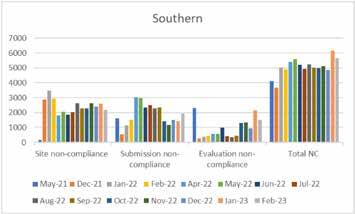
During my employment with British Rail, I recall the introduction of safety responsibility statements to comply with the Health and Safety at Work legislation. There were occasions when it became necessary for speed restrictions and even line closures to be imposed. As the responsible engineer, I held a ‘Go to Jail’ card. If I was overruled and proposed work was delayed or changed, a more senior engineer became responsible. Examiners, who were mostly trained and time-served tradesmen carried out their work and, as the responsible engineer, I checked, noted any concerns, and took appropriate action when repairs were needed.
As a divisional civil engineer with assistant engineers specialising in both track and structures, we had the authority to lift restrictions imposed by our people but in doing so took responsibility for the safety of the railway. My engineering decisions could only be challenged by a more senior
qualified engineer from the regional organisation or board level who could then be held personally responsible. This could and did lead to conflict with our operating colleagues.
I also recall cold, wet shifts when I inspected tunnels and tunnel shafts in finger-tip examinations on the coldest of winter nights. Invariably we found new developing problems on every detailed inspection. I also have memories of random sample audit checks I made to assure myself of the accuracy and detail of reports of examiner’s inspections and the discovery of areas marked as “not examined”, and even of failing buried structures of which there was no record.
As progress is made to catch up with the backlog, I suggest it is imperative that the fitness for purpose of the suitably qualified inspectors and professional engineers, and the contracts under which they are working is clarified and, where necessary, improved. Personal as well as organisational competences and liabilities of those doing the inspections and drafting reports should always be independently scrutinised.

Reports need to be checked and signed by individuals whose qualifications, experience, and job descriptions make clear their competences, liabilities, and accountabilities. When repairs or renewals are delayed, those engineers who make the decisions should also assume responsibility for the continued use, imposition of restrictions, or closure of the structure or track. I also remember how carefully decisions were made to increase the frequency or scope of examinations when a structure was beginning to fail to the extent that it could soon become necessary for it to be propped, axle weight or speed restricted, or even taken out of service at short notice. I recommend that the ORR consider carrying out their own checks of Network Rail examination reports by conducting their own examinations. A degree of assurance of structural safety or an indication that more needs to be done should be the result.



Following on from ORR’s letter to Andrew Haines, the chief executive of Network Rail, in the past two months the regulator has issued further recommendations aimed at the industry as whole. The advice covers areas as far-reaching as passenger assistance, climate change, employee health, and safety on heritage railways. RailStaff gives you a round-up of its most recent guidance.

The rail industry needs to provide more reliable assistance for disabled passengers, the ORR has said, following research involving more than 8,100 passengers.

ORR’s 2023 annual rail consumer report, published on 12 July, showed that where passengers receive assistance, they are satisfied with the process of booking and receiving help, however there are still too many accounts of passengers not receiving the assistance they had booked.
This year has seen a 74% increase in the number of bookings for passenger assistance and the number of Disabled Persons’ Railcards in circulation is up 11% on last year. This suggests that more disabled people are returning to the railways, and
the ORR has said it is vital that the reliability and consistency of the service is improved.
ORR’s research indicates signs of improvement, with overall passenger satisfaction with assistance increasing from 86% to 90%. The regulator has highlighted the progress of train operators and Network Rail in delivering the disability awareness training it requires, however there is still some way to go.
Stephanie Tobyn, director of strategy, policy and reform said: “The industry has made progress in supporting the needs of disabled passengers and many people have a positive experience of booking and receiving passenger assistance. However, our research shows that there are still too many instances where assistance fails and when this happens the impact on disabled passengers can be significant, creating unnecessary anxiety and frustration.
“Operators must continually focus their effort on providing reliable and consistent assistance and we will be working with the rail industry and passenger groups on how to achieve this.”
ORR’s Experiences of Passenger Assist Report can be found here:
In its 2023 health and safety report, released on 19 July, the ORR said that Network Rail must ensure it delivers the changes needed to address the risks of climate change, and, along with the rest of the industry, continue to improve the management of the health of its workers.
It’s report notes Network Rail has been working on action plans focused on improving the management of earthworks and drainage, originating from recommendations following the Carmont accident in 2020. ORR praises the progress that has been made, such as adoption of better weather forecasting, however it stresses that Network Rail must do more to drive change across its regions.
The report adds that while the regions are committed to maintaining their drainage inventories, completing the work to find ‘lost’ drainage assets has been challenging. The rail regulator also said that in some cases current drainage inspections were not being carried out with suitable rigour and that having dedicated teams would ensure better quality and consistency.
ORR says Network Rail’s drainage management planning has been affected by inadequate staffing levels but the regulator has been assured that the infrastructure manager is committed to fully resourced drainage teams by the end of March 2024.
ORR also called on Network Rail to improve its management of vegetation on buildings and structures, after finding that across three of the regions inspected, Vegetation Management Plans (VMPs), a first step in effective vegetation control, were either absent or incomplete.
Another key theme of the 19 July Report is the rail industry’s responsibilities for looking after its workforce.
Positive actions taken by Network Rail in the past year include improving safety for track workers in lookout roles and working on overhead lines.
However, ORR has expressed concern about managing fatigue of workers. The regulator said it was encouraged by Network Rail’s recognition that its own fatigue controls required improvement, adding that it intended to issue revised guidance to the sector setting out its clear expectations and understanding of the law.
The report also notes Network Rail is moving forward in developing state-of-the art occupational health services provision, which, for the first time, will offer centralised services to the whole mainline railway.
Despite this, ORR says it is unacceptable that industry has failed to provide adequate toilet facilities for staff, a legal requirement, adding that operators should provide shared access to their own facilities.
Ian Prosser, HM chief inspector of railways, said: “Financial challenges, changes to travelling and working patterns, weather extremes, and industrial action have brought uncertainty to the rail industry, but Great Britain’s railways consistently perform as one of the safest in Europe.
“To keep it in that position, the industry must redouble its efforts of managing its assets and the environment around them because of the threat of extreme and variable weather conditions on the network.
“A safe railway also relies on its workers to be at optimum performance, so it is of paramount importance that industry reduces fatigue levels.”

Follow the QR CODE to read ORR’s Health and Safety Report 2022 to 2023:



Finally, on 1 August, ORR published guidance for minor and heritage railways to help them interpret and apply the requirements of Railways and Other Guided Transport Systems (Safety) Regulations 2006 (ROGS).
All railways need to comply with ROGS, although some transport systems, including minor and heritage operations, can be excluded from what is required of their mainline counterparts. That said, every railway is expected to have a Safety Management System (SMS) and the new guidance provides a summary of the ROGS requirements for SMS and how minor and heritage dutyholders may apply these to their own railways.
The ORR has encouraged all of these operators to consider the contents of the guidance and take appropriate action, and has asked for feedback on the new guidance to assist it with future revisions.
The full document can be viewed here:
The construction of HS2 has delivered a huge boost for regional economies, creating major contracts for UK businesses and delivering fulltime job roles for thousands. In February this year, RailStaff reported on the recruitment and training opportunities the project was creating up and down the country. Today we take a look at the how, six months on, HS2 continues to provide people with a leg up the career ladder.
Skills, employment, and education are strategic objectives for HS2 and are critical in achieving the vision of the project being a catalyst for growth across Britain. Over a third of its workforce was formerly unemployed, and the focus on delivering training and fast-track employment programmes is helping people from disadvantaged and underrepresented groups to launch careers on HS2.
Through partnerships with local authorities, employment support services, and charities, HS2 is working hard to help those seeking

employment but who need additional support or training.
At the end of June, it celebrated a milestone as it confirmed that over 3,000 people who were out of work have gone on to secure jobs on the project. Its drive to support those who are unemployed, and upskill people ready for work, has led to 3,221 people launching a new career. That’s close to 10% of the workforce
supporting HS2’s construction. Opportunities exist up and down the country. The reach of HS2’s supply chain means people who were out of work in Wales, the North West, North East, Yorkshire and Humber, and the South East are among those to have secured jobs on the project.
Dedicated Skills Academies, run in partnership with local training providers and
colleges, are delivering hundreds of free training programmes to help people build new skills. At the same time, HS2’s contractors are providing work trials to give candidates an insight into the industry, helping them to understand the career pathways and progression opportunities.
Training programmes have so far helped candidates to launch careers in ecology,

planning, CAD and design, engineering, plant operations, and support functions including finance and community engagement.
“We’re exceptionally proud that we’ve helped over 3,000 unemployed people in England and Wales start a new career on HS2,” said Natalie Penrose, HS2’s head of legacy. “Whether through apprenticeships, specialist fast-track training programmes, or referrals from our partner agencies, every candidate has gained new skills and vital work experience that will put them on track for a promising future.”
Among those to have secured work is 64-year-old James Burke from Birmingham. James had been unemployed for over a year, but that changed when he attended a HS2 careers event in nearby Chelmsley Wood.
James signed up for a 20-day paid work trial with Balfour Beatty VINCI (BBV), HS2’s construction partner for the West Midlands. His previous experience working on construction sites, along with his appetite for hard work, led to him securing a full-time role. He is now part of the team delivering BBV’s programme of tunnelling works in Birmingham and Warwickshire.
“The sense of teamwork and the level of professionalism from everyone involved in driving forward HS2’s tunnel boring progamme is just brilliant,” said James. “Being on site is becoming addictive. The site supervisors are great mentors, I’m learning so much.”
As it rolls through the country, HS2 gives back to the local communities it affects, creating jobs for those who need them most.
In May, for instance, Buckinghamshire residents were given a helping hand to launch a career in construction with HS2’s Aylesbury-based contractor, Blackwell Earthmoving Limited.
HS2’s construction partner, Eiffage, Kier, Ferrovial Construction and BAM Nuttall (EKFB), appointed Blackwell Earthmoving to deliver the earthworks on a 30km section of the route from Calvert South to the North Chilterns. The scale of work to create the embankments and cuttings for Britain’s new high-speed railway is extensive, and the team forecast more local jobs would be created as a result.
To ensure local people were first in line to benefit, the team worked closely with Bucks Training Academy to support those looking for a new career. A local recruitment campaign resulted in over 1,500 enquiries.
Ignacio Chicharro, project director at EKFB said: “We’re delighted that Blackwell is going the extra mile to ensure local people benefit from the jobs it is creating. Over the next three years, around 12million cubic metres of earthworks will be delivered on this section of the HS2 route. It’s a huge operation, and it’s fantastic that the local community is playing a part in what we’re delivering.”
Stephanie Oliver, 36, and Lincoln Dhana, 45, both completed their training and transitioned straight into full-time employment.
Stephanie, who worked as a care worker during the pandemic, never imagined she’d find herself driving a 60-tonne dumper truck, but the career change has left her feeling less stressed and gives her more time to spend with her family.
“If I’d known there was a role like this for me in construction, I’d have gone for it years ago,” she said. “I didn’t imagine myself driving a 60-tonne truck, but now I’m here I absolutely love it.”
“This is my first full-time job, and it gives me the security I need to provide for my family. Being local also means I have a great work-life balance, and for me that’s really important.”
Over the last year, Lincoln has completed three different training courses, which means he’s now qualified to operate a broad range of plant machinery. He said: “I’ve progressed really quickly, and new doors are opening for me all the time.
“Working as part of the team on HS2 is rewarding. You can see exactly how you’re contributing to building the railway. I’ll be able to look back knowing that I was part of the team that helped to make it all happen, and that’s amazing.”
Blackwell Earthmoving currently employs around 125 people to help it deliver its programme of work on HS2. It’s proud that 13% of their workforce is female and that two thirds of its trainees come from the local area.
“We’re about careers, not just jobs,” said Paul Bird, Blackwell’s Resources Lead, “and that’s why we invest heavily in training our workforce. The ability to live and work locally is really important to people and that’s what we can offer, alongside the promise of a long-term career.”
The construction of HS2 is also playing a pivotal role in helping University graduates to transition straight into careers aligned to their specialist subject areas. Hundreds of students have moved in to graduate-level roles with HS2’s construction partners after finishing their studies.

Among those to have launched a new career is 26-year-old Alisha Bhakta from Birmingham. Alisha graduated from De Montfort University Leicester with an Honours degree in English Language and Literature. She spent months trying to find a job that reflected her skillset or offered career progression opportunities.
The chance to start a work placement with BBV, HS2’s construction partner for the West Midlands, sparked the career turnaround she was looking for. After completing her placement in 2020, Alisha immediately secured a permanent role in BBV’s document control team where she continued to impress. Now, three years on, she’s secured two promotions and transitioned into a role in information management, where she has line management responsibilities and the opportunity to expand her team.
“I would never have considered that a career in construction might be for me,” said Alisha, “but that’s the great thing about a project of HS2’s size and scale, as there are so many opportunities.
“I work with a fantastic team at BBV and my confidence has grown. Moving out of my comfort zone and into something new has really helped me, and my career, to progress.”

HS2's construction partner Align JV is also helping unemployed people to launch new careers. Queenie Villarente graduated during the Covid pandemic and had been struggling to find a role that suited her studies in Engineering. After many unsuccessful applications, she secured a space on Align's pre-employment programme at the end of 2020.
The programme specifically supported women who were looking to start a career in Construction, and Queenie was introduced to a resourcing manager who helped her to secure a position working on HS2 as a Plant Clerk.
Since joining Align, Queenie’s career has developed rapidly. She is now operating as a TBM (tunnel boring machine) control room and data engineer.
“My experience at Align so far has been amazing,” said Queenie. “The environment in which I work is definitely a good place for growth and development. It’s a place where my voice and opinion matters, with every day offering new challenges and opportunities. I work as part of a team which is very united, working together to achieve our goals. I am very happy to be part of what is a fantastic project.”
With the high-speed project expected to roll on well into the 2030s, it is crucial to plan today to recruit personnel for tomorrow. HS2 and its construction partners regularly engage with local educational institutions to inspire the workforce of the future.

In July, primary school pupils at Chipping Warden Primary Academy in Oxfordshire got an exclusive tour of one of the project’s construction sites.
The pupils, aged 4-11, donned mini safety helmets and high-viz jackets before boarding the site safari vehicle for a tour led by engineers and specialists from EKFB. The tour provided a safe environment for the pupils to learn about the bridges, viaducts and tunnels being built in their local area.
During the tour, the pupils saw first-hand the diggers, excavators and specialist machinery being used to build the new railway. They made notes and drew pictures on their activity sheets, which were developed to enhance the learning programme.

“We’re exceptionally proud of the work that EKFB is doing with local schools in Northamptonshire and Buckinghamshire,” said Jhen-Nel Swanston, HS2’s legacy manager for the region.
“The new site safari programme is a fun and safe way to bring young people onto our construction sites where they can learn about how HS2 is being built. Hopefully the programme will help to inspire the next generation of engineers that will build the HS2 network to Manchester and the East Midlands.”
Four of HS2’s other construction partners recently joined forces to deliver a new education programme for young people in Ealing with special educational needs and disabilities (SEND). The initiative forms part of HS2’s Skills, Employment and Education Strategy, which aims to encourage more young people to consider transport infrastructure related careers.
Balfour Beatty VINCI SYSTRA, Skanska Costain STRABAG, Mace Dragados, and Align JV worked with the Ealing SEND Hub to deliver the programme. During the eight-week course, the four contractors delivered science, technology, engineering, and mathematics (STEM) learning sessions and provided tours of HS2’s construction sites.
The sessions explained the different jobs and skills needed to build the new high-speed rail network and provided guidance on career pathways – including opportunities to join HS2 on work experience and placement days.
Three schools in Ealing – John Chilton, St Ann’s, and Springhallow – took part in the programme, which was tailored to meet the learning requirements of each schools’ pupils. The pupils were encouraged to explore how their skills aligned to different job roles, and they were given the opportunity to take part in mock job interviews.
Ambrose Quashie, HS2’s legacy manager for Greater London said: “We want local people to benefit from the jobs and opportunities that HS2 is creating, and our contractors are working exceptionally hard to create pathways into training and employment for young people and adults with SEND.
“We look forward to working with the Ealing SEND Hub to engage more young people in the months and years ahead, and we hope that this initiative will inspire young people to
consider a career on HS2 in the future.”
HS2 and its construction partners are Disability Confident employers. They work closely with employment support services and local charities to help people with SEND to launch careers helping to build Britain’s new railway.
Lisa Quinn, co-director of Business Education Events, a community interest company which brings employers and students together says: “This was an incredible experience for our young SEND people who were given access to everyone working on HS2, from catering staff to engineers and the senior management team. Each session was meticulously planned with the disabilities of the students in mind. The programme was inclusive and showed dignity to all, we can’t wait to come back.”
HS2 has opened up a wealth of opportunities to get people back into work and encourage mid-career workers to consider a new direction. It is developing cooperative relationships with the regions it rolls through, offering to upskill and employ locals who provide the manpower required to complete the project. Not only that, but the construction of HS2 is encouraging today’s students to consider a career in rail and providing the training opportunities for them to make this ambition a reality. Future generations will surely benefit from the skills legacy that the project leaves behind.

SIGNALLING ENGINEERS NEED TO MAKE SURE THEY DON'T BECOME COMPLACENT. KEEPING THE CONSEQUENCES OF ACCIDENTS AT THE FRONT OF THEIR MIND IS KEY.
Complacency can lead to accidents which can have devastating consequences, the likes of which don’t need spelling out to anyone working in the rail industry.
Those of us who have driven cars for years will appreciate how we can easily make small errors out on the road. It is the same for signalling engineers, particularly those doing maintenance and performing the same tasks repeatedly. It is very easy to become complacent and fail to complete your work thoroughly, and unfortunately that is one of the most difficult things to counteract.
The vast majority of signalling engineers have received good training and, when tested, know how to do their jobs correctly. But this doesn't mean they do it right every single time. It only takes one slip of judgement for an accident to happen.
Engineers who have witnessed rail accidents know how devastating they can be. However, getting this across to those who have never seen a crash is difficult. Obviously, you can’t send engineers out onto the track to see a real train crash. This can only be done in the virtual world. That's why we created a Virtual Reality (VR) system for signal maintenance engineers which provides a virtual world where they can carry out their tests and see what happens if they don't get it right.


We have created an Aspect Test for an on-track signal. The engineer has their list of checks to complete and, if they don’t perform them all in the correct order, the trainer does not tick them off on the system. At the end of the test, the trainer can run a virtual train through that piece of track and, if the checks haven’t been completed correctly, the train will crash in front of them, with all the sounds that go with that to
make it as real as possible. The engineers are then taken into a darkened room and shown headlines from previous rail crashes. This brings home the idea that, in the event of a crash, they would be national news the next day.
We’ve found that this is an effective way to tap into the engineers’ emotions, so that staying alert and on form is at the forefront of their mind each time they go out. We’ve already won an Enginuity Skills and Innovation Award for the system.
Engineering is seen as a very technical activity, but the challenge is to change how engineers think and feel and about their work. We can give engineers all the technical skills in the world but ensuring that they put them into practice every single day, is a much more difficult proposition.
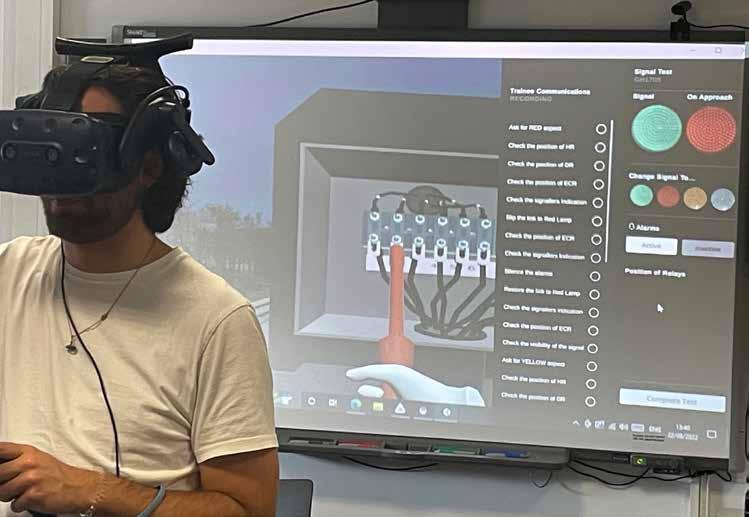





Whether it’s brushing up on existing skills, poring over the latest regulations, or boosting your credentials for a brand new role, for rail staff the learning never stops. The industry is generous when it comes to qualifications and courses. Here’s a round-up of the latest training news.
Morson Training, the learning and development division of the Morson Group, has become Network Rail’s key strategic partner for training delivery and appointed as Master vendor for track safety, first aid, working at height, and portable transportable and mobile plant (PTMP) equipment.
The four-year commitment, with the potential of a further four-year extension, is one of the biggest contracts of its kind in the rail industry and signifies a renewed effort to meet the UK’s increasing rail infrastructure demands through the training and upskilling of Network Rail personnel nationwide at all stages of their career, including those on track and office-based colleagues.
A City & Guilds and National Skills Academy for Rail report, published in 2019, highlighted the urgent need to address the industry’s skills shortage, predicting that up to 120,000 additional people will be required by 2030, with demand for skills reaching its peak in or around 2025.
The partnership with Network Rail also heralds the launch of the first ever national rail training and assessment academy. Designed to facilitate pathways into the exciting world of training and assurance, the Morson Training Academy will increase the bench strength of the training provision in the industry and futureproof the sector.
The training facility is an example of Morson Group’s commitment to future proofing skills and the desire to support large scale infrastructure projects by delivering effective, on the ground training and education.
Network Rail’s head of training, Guy Wilmshurst-Smith commented: “This partnership represents a step change in Network Rail’s training procurement practice, meaning all suppliers delivering track safety, working at height, portable plant and first aid training will now need to work with Morson Training to deliver into Network Rail.
“As the demand for training across Network Rail grows, working in tandem with Morson Training delivers
a streamlined approach which will drive quality and collaboration and at the same time allow training suppliers up and down the country to get involved. We’re excited by the prospects and look forward to seeing the benefits and opportunities that implementing this training structure is sure to bring.”
Matthew Leavis, group training director at Morson Training added: “We’re proud to have worked with Network Rail for several years now. They have always been committed to developing their team and we look forward to combining our expertise and resources to further improve their training capabilities.”

Friday 30 June saw the official grand opening of Quattro Group’s AB2T Academy (pictured below), the industry’s newest rail and construction training facility. Based in the Heartlands of Scotland at Junction 4a off the M8, the new academy will use the latest machinery to train new recruits into the industry.
The training academy offers a wide range of courses including CPCS construction, crane and driver training, PTS rail training, Multiple RRV operations, MEWP training and more. AB2T Training Academy is accredited by NOCN CPCS, NSAR, and the SQA.
After a short speech and ribbon cutting by Managing Director John Murphy, visitors including customers, clients, suppliers, and prospective candidates toured the site to get up close and personal with the latest machines across 175,000 sq ft of land.

Visitors were impressed by the rail training area, as they walked alongside the length of Scotland’s longest twin rail tracks with real overheads. Various road-rail vehicles were parked along each 150-metre track, including one of the company’s brand new MEWPs and two road-rail excavators, as well as one of the aforementioned monumental Mad Vax RRVs.
“The AB2Team is ready and ‘Able 2 Train’ across a huge variety of machines which are exciting, challenging and a lot of fun,” said John. “In the current climate, the construction and rail industries can guarantee decades of work. How many industries can make that claim?”
“Whilst Quattro continues to train around England and Wales the focus for AB2T will be Scotland. We are committed to teaching the next generation of rail and construction workers. We aim to change perceptions and bring dignity to the profession. We’re looking to attract the future of Scottish industry through these gates.”
Visitors to the opening day praised the initiative: “The Scottish crane industry is currently battling against a massive shortage of drivers,” said Lyle Sibbald of Liebherr Cranes. “The opening of this new training academy will certainly help in the fight to bring new crane operators into the industry.”

Network Rail and the Chartered Institute of Railway Operators (CIRO) have come together to launch three new capacity planning qualifications for use in Network Rail’s internal training programme.
The new qualifications will be awarded by CIRO and delivered by Network Rail ‘s capacity Planning, Training and Development Team in Milton Keynes. They are aimed at standardising capacity planning and offer a clear path of potential progression and developmental experience for operational planners and specialists, through the following tiers:
• CIRO AO, Level 2 (Certificate) in System Operator Timetable Development.
• CIRO AO, Level 3 (Certificate) in System Operator Strategic Timetable Development.
• CIRO AO, Level 4 (Diploma) in System Operator Strategic Timetable Development and Production.
Development of the qualifications began in 2019, when Carolyn O’Sullivan, Network Rail’s training and development manager (Capacity Planning), recognised the need for a more robust framework.
Network Rail and CIRO collaborated on a third capacity planning paper to utilise
the knowledge of several subject matter experts and to supplement the existing two competencies. Forming the third level means that there’s now a comprehensive training plan that all new entrant planners must complete to achieve the full Level 4 Diploma.
Following a successful pilot scheme of the new paper, discussions began with CIRO, which had received a Royal Charter in 2021, allowing it to award qualifications and enabling it to become the only sector specific standard setting body for rail.
Carolyn, who led the project for Network Rail, said: “By collaborating closely and harnessing our collective expertise, Network Rail and CIRO have created something which will enhance the training experience of our Operational planners, and ultimately raise the standards for our organisation and wider industry.
“Our teams have worked hard over the past few years to bring this to reality and were delighted to see the first operational planners and specialists coming through the programme”.
The first certificates (level 2 and 3 certificates) will be awarded during the Autumn as operational planners and specialists complete the course and competencies. Network Rail and CIRO are currently looking at further opportunities for collaborative training product development.


The Rail Safety and Standards Board (RSSB) has launched a ‘Carbon Literacy for Rail’ training course to help the rail sector move forward on decarbonisation.

The new course has been prepared by RSSB’s sustainability experts for anyone working in rail infrastructure, train operating companies, and the supply chain. It provides delegates with the knowledge and skills to lower their personal and organisational carbon footprint in line with rail industry targets.
The training course is accredited by the Carbon Literacy Project to meet the ‘Carbon Literacy Standard’, with delegates successfully completing the course certified as ‘Carbon Literate’.
George Davies, RSSB’s director of sustainable development said: “As we move forward with action to make the railway even more sustainable, helping colleagues
understand the challenges and know what they can do to help will be crucial.
“Environmental and social sustainability are essential elements of the long-term vision for the rail industry, and the Sustainability Team at RSSB are taking a leading role in defining an industry-wide approach for sustainability.
“Our Carbon Literacy for Rail training course will raise awareness of carbon emissions. We want to make it relevant to everyday activities, giving people the ability and boost motivation to reduce emissions, on an individual, community and organisational basis".
Nicola Martin, head of sustainability at TransPennine Express added: “While Rail only contributes a small part of the overall emissions from transport in the UK, it can be a key contributor to the solutions needed to achieve net zero by 2050. It’s a priority for TransPennine Express, and we asked RSSB to develop this course to help us and the wider rail industry meet the challenge".
“This carbon literacy training provides an excellent opportunity to review climate change science and discuss climate change context in line with the rail industry and transport decarbonisation goals”.

Analytics solutions firm CACI has announced that its Cygnum software is now being used as Network Rail's planning and administration solution for training its 43,000-strong workforce.
Cygnum supports all aspects of Network Rail's training management, from automated creation of courses, intelligent allocation of staff, trainers and resources to courses, to communication of planning and optimisation of changes.
Cygnum will assist Network Rail in achieving a complete view of all its training and results, helping it to realise efficiencies across the process and ensure that all staff are appropriately trained. The attendance and results of courses are logged in Cygnum, with the system submitting course invitation and joining instructions to Network Rail staff, as well as actioning any follow-ups as required.
"We are delighted that Network Rail has chosen CACI's Cygnum software to support and underpin its training planning and administration process," said Ollie Watson, group business development director at CACI.
"We are looking forward to supporting Network Rail in achieving a more efficient and streamlined training programme that delivers necessary and ongoing training to its workforce as optimally as possible."

Connecting the UK rail industry for over 26 years.























The Department for Transport (DfT) has announced that Anit Chandarana, lead director of Great British Railways Transition Team, will be joining it as interim director general for its Rail Infrastructure Group.

Anit will work closely in partnership with GBRTT, DfT colleagues, and the sector to deliver the government’s vision for rail reform as set out by the Secretary of State in his Bradshaw Address, progress plans for the establishment of Great British Railways (GBR), and ensure the benefits of a guiding mind for the railway are delivered as soon as possible.
He will begin in role in August and takes with him 20 years of experience in the rail industry, including 19 years at Network Rail.


Neil Grabham has today been named as the new managing director of Merseyrail.
Currently the customer services director for East Midlands Railway, Neil brings a wealth of experience both from the rail sector and beyond, having previously undertaken senior leadership roles for Greater Anglia, Signet Jewellers, and Lidl.
Neil replaces Andy Heath, who left Merseyrail earlier this summer and Jane English who has been acting managing director for the last 10 months.
Merseyrail, which runs
600 rail services per day across the City Region, is currently part way through the roll out of a pioneering new fleet of class 777 trains onto the network as part of a significant modernisation programme on behalf of the Liverpool City Region Combined Authority.
Neil will lead the business through this change with a focus on delivering the highest quality rail service for local people on behalf of the Combined Authority, in partnership with Merseyrail’s shareholders Serco and Transport UK.
Neil said “I feel very proud to have been given the opportunity to lead the

HS2 Ltd has announced that its chief executive officer, Mark Thurston, is to step down after six-and-a-half years at the helm of Europe’s largest infrastructure project.
Phase One of Britain’s new high speed rail network, between London and the West Midlands, is at peak construction and the organisation will soon begin to transition its focus and skills to railway systems, including signalling, track, and power.
To ensure continuity through the coming years, Mark will hand over to new leadership who will lead the transition to the next stage of the project.
Mark said: “Leading this organisation has been the highlight of my career and a privilege from the first day - the programme has come such a long way and I want to thank everyone who has worked on the project during my time.
“The next 18-24 months will see the project move into an exciting
new stage. I have agreed with the board that someone else should lead the organisation and programme through what will be another defining period for HS2.”
Mark joined HS2 in March 2017, shortly after the organisation secured Royal Assent for Phase One, giving the powers to build the first section of the railway. He built the capability of the organisation to enable it to be an effective project manager for the delivery of Europe’s largest infrastructure project.
In 2020 he secured government’s approval to move into major construction works and fully mobilised a workforce which stands at 28,500 today, including 1,200 apprentices.
Mark Harper, Secretary of State for Transport, said: “I’d like to thank Mark Thurston for his work over the last six years progressing Britain’s most transformative rail project. As well as successfully overseeing the start of construction, he has ensured HS2 has created tens of thousands of
skilled jobs and apprenticeships across the country.
“As HS2 enters its next phase, the Government remains committed to unlocking all the benefits of this flagship infrastructure scheme – increasing rail capacity, connecting communities and growing the economy.”
Construction of the first phase of HS2 is now at its height, with major works taking place at over 350 sites between London and the West Midlands.
Along the route, six tunnelling machines have been launched, works on the longest railway bridge in the UK (the Colne Valley Viaduct) are well underway and the ‘Marston Box’ rail bridge has been successfully slid into place over the M42 motorway in the most ambitious project of its kind anywhere in the world.
Additionally, 19 construction sites are now operating completely diesel-free and nearly one million new trees have been planted alongside the railway.
fantastic team at Merseyrail, who I know share my ambition to deliver a railway that the communities we serve can be proud of.
This is an exciting time of transformation, with new trains being introduced, and the opportunity to deliver real improvements in the journey experiences of our customers”.
Neil will take up his post from mid-August.
Sir Jon Thompson, Chairman of HS2 Ltd, said: “Mark’s leadership has been critical to the success of the HS2 programme. In his time as CEO the project has moved from a scheme in development to a major construction project that employs 28,500 people across the country.
“His legacy is building the foundations of HS2 which will bring growth and prosperity to towns and cities across the Midlands and the North. I want to thank him for his leadership and service.”
Mark will leave HS2 Ltd at the end of September this year, when Sir Jon Thompson will become executive chairman for an interim period while a new chief executive is recruited. He will be supported at board level by his deputy chair, Elaine Holt.


GCRE Limited has announced the appointment of Rob Forde as the company’s new director of strategy and skills.
Rob will oversee the Global Centre of Rail Excellence’s (GCRE) skills and long-term strategy working with clients, academics, and industry partners to speed up research and development cycles at the new rail innovation facility currently being built in South Wales.
Prior to joining GCRE, Rob was industry sector lead for Network Rail on the East Coast Digital Programme and before that part of Network Rail’s research and development team, leading the accelerated innovation programme and helping secure a six-fold increase in the budget for CP6.
Simon Jones, chief executive of GCRE Limited, said: “We are delighted to have Rob Forde join our team and take on this critical role as director of Strategy and Skills at the Global Centre of Rail Excellence. Rob has a strong track record in the rail industry over
nearly two decades and joins GCRE at a very important moment.
“To be a success, GCRE will need to develop a long-term pipeline of skills, working with schools, universities, colleges, and the industry to ensure that both GCRE and its clients have access to the talented people it needs to support the high-quality research and innovation work we will do on site.
“Building that pipeline of skills and, in particular, ensuring that people living near to the site can benefit from the jobs and skills we will be offering is one of the most important things Rob will be working on.
“This is a new role that we have created and reflects the vital importance that we attach to making sure that the infrastructure that supports our new facility is strong.”
Rob added: “I’m delighted to be joining the GCRE team and to be taking on such an exciting and interesting new role in the team. I’ve spent my career working in innovation and R&D, so it’s great to be able to make a


Siemens Mobility has announced that Rob Morris, managing director of rail infrastructure (RI) and Sambit Banerjee, managing director of rolling stock and customer services (RS/CS), have jointly assumed the role of chief executive officer of Siemens Mobility United Kingdom and Ireland.
Rob and Sambit will combine the joint CEO roles with their existing responsibilities. They will also join the board of directors for Siemens Mobility Limited, with chief financial officer (CFO) Julie Owen, as chair of the board.

Rob joined Siemens Mobility, Rail Infrastructure (RI) in January 2015, as the director of operations and took the role of managing director, RI in 2017. He has a career spanning five decades in multi-disciplined major projects working for mining, power, general
construction, and technologybased businesses both internationally and in the UK.
Sambit Banerjee has been with Siemens for more than 25 years and worked across Siemens businesses spanning multiple global markets. He took up the post of UK finance director at Siemens Mobility, Rolling Stock and Customer Services (RS/CS) in 2013 before being appointed managing director for RS/CS in 2019.
contribution to such a vitally important new facility on the rail landscape.
“The GCRE will become Europe’s premier site for rail innovation, supporting the development of new ideas that will bring new products to market faster; help develop more cost-effective rail infrastructure and support the industry’s path to net zero.”
Julie Owen, CFO and chair of the board of directors, said: “I am delighted to welcome Rob and Sambit, with their wealth of experience, to the Siemens Mobility Limited Board and I’m looking forward to continuing our work delivering for our customers and helping transform rail travel in the UK. Of the many projects we are delivering, I’m excited that our new rail village in Goole will shortly commence manufacturing trains and add to our existing rail infrastructure manufacturing sites in Chippenham and Ashby – all of which have a significant impact on growth and skills in our local communities.”
Scotland’s Minister for Transport has announced the appointment of a new non-executive director to the Board of Scottish Rail Holdings Limited, the Scottish Government company that owns ScotRail and Caledonian Sleeper.
Brian Baverstock took up the post on 1 August. He is a qualified accountant with significant experience in leadership roles (executive and non-executive).

Brian is an independent consultant, specialising in the provision of governance and risk management training, support and advice to mainly public bodies and charities across the UK and Ireland.
He has previously worked across the public and private sector including executive level posts within the Scottish Government and the Scottish Funding Council.
Decarbonisation expert Romain Pison has joined Systra’s UK & Ireland Consultancy division.

Romain joins the company as director of decarbonisation and will consolidate and expand its existing offering supporting public and private sector clients in achieving their Net Zero ambitions.
Romain is an award-winning transport director with 25 years
of experience designing, leading, and implementing complex, multimillion-pound transport projects and green policies across the world.
Romain is leading Systra’s market growth in ESG consulting and advisory services, focusing on infrastructure, supply chain, and nature-based solutions. He joins the company from sustainability software company Wiia which he co-founded in 2020, and was Green Infrastructure specialist with the World Bank from 2013.
Sébastien Dupont, managing director consultancy at Systra, said: “We are delighted to welcome Romain to our growing team in the UK & Ireland. As well as the passion he brings to the challenges of creating a liveable net zero world, Romain also brings an excellent track record in building strong public-private partnerships and identifying key opportunities for digital transformation that will complement our already strong decarbonisation service offer.”
DB Cargo UK has appointed a new chief transformation and digitalisation officer as part of its plans to further improve the company’s operational efficiency and customer service.
Rohan Kapoor (BEng, MBA), who was previously the IT director in charge of digital transformation at National Grid, will join the company with immediate effect.

Rohan is an accomplished professional with more than 16 years of experience in digital strategy, cost optimisation, change implementation, and global project management.

He has extensive experience of delivering large-scale IT transformations to help companies achieve business critical objectives.
Commenting on his appointment, Andrea Rossi, DB Cargo UK’s chief executive, said: “DB Cargo UK is delighted to welcome Rohan at a time when we’re looking to accelerate our plans to introduce greater automation and digitalisation into the business.
“These are challenging times for the rail freight sector and the work Rohan will be leading on will deliver more innovative, cost effective and agile solutions that will enhance the experience of both our colleagues and our customers,” he added.
Trenitalia c2c has appointed Eleni Jordan as its new commercial director.

Eleni is set to start in the new role in September, joining from Chiltern Railways where she has served as commercial and customer strategy director for the past six years. In this role she was responsible for passenger and ancillary revenue and more recently, the post-pandemic growth strategy.
Rob Mullen, managing director at c2c, said, “We are delighted to be welcoming Eleni to the c2c team. She brings a wealth of experience and will be fundamental in our continued transformation as we focus on ensuring profitable growth and ensuring partnerships with key local stakeholders and businesses.”
Eleni said, “I’m thrilled and delighted to be joining Trenitalia
c2c, which is a formidable business delivering safe and reliable services to its customers, with high levels of customer satisfaction, every day.
“I’m extremely excited to build upon all the fantastic work which has taken place and to drive forward new and innovative ways for c2c to further flourish and grow in order to build a sustainable business for our customers and stakeholders. I’m very much looking forward to working with colleagues from across the whole business in the UK and overseas, to deliver on our business strategy and key objectives,” she added.
Before joining Chiltern Railways, Eleni was head of commercial development at Abellio Greater Anglia and prior to this held roles at the National Express group, Heathrow Express and British Airways Holidays.


























